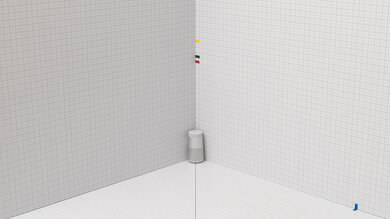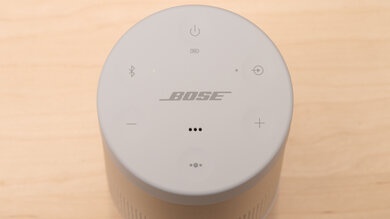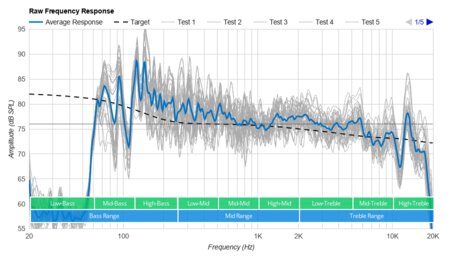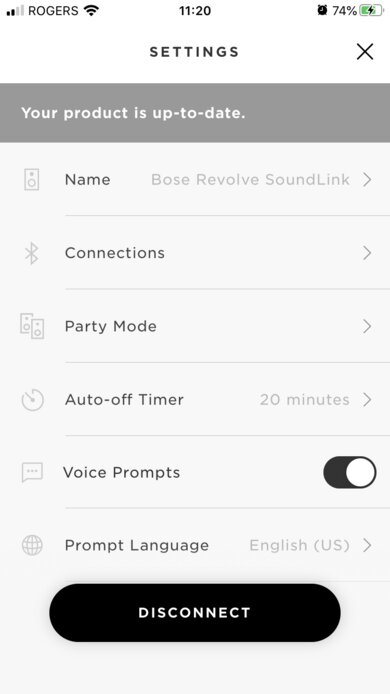The Bose SoundLink Revolve is a well-built Bluetooth speaker. It has a sleek design, and it's small and easy to bring with you on-the-go. It's rated for dust, impact, and water resistance, so you can use it outdoors, though we don't test for this. Unfortunately, it lacks low-bass and it doesn't get very loud. However, its balanced mid-range makes it suitable for listening to vocal-centric content like podcasts and audiobooks.
Our Verdict
The Bose SoundLink Revolve isn't bad for music. Its sound profile is quite neutral, especially in the mid and treble ranges where vocals and lead instruments are reproduced. However, it lacks a lot of low-bass, which is disappointing for fans of bass-heavy music genres. Its 360° speaker system helps create large and wide directivity, but unfortunately, it doesn't get very loud.
- 360° speaker system.
- Multi-device pairing.
- Lacks low-bass.
- Not very loud.
The Bose SoundLink Revolve is middling for videos and movies. While its balanced mid-range can reproduce dialogue clearly, it lacks a lot of low-bass, so you don't feel the deep thump in action-packed scenes. It doesn't get very loud, and it has to downmix stereo content into mono, which isn't very immersive. Its latency on iOS and Android devices is high, though some apps compensate for latency differently, so your experience can vary.
- 360° speaker system.
- Lacks low-bass.
- Not very loud.
The Bose SoundLink Revolve is very good for podcasts. This portable speaker has a balanced mid-range, so it can reproduce voices clearly and accurately. It's Bluetooth-compatible, so you can easily stream podcasts wirelessly from your phone or tablet, and you can pair it with up to two devices at the same time. However, it doesn't get very loud.
- Multi-device pairing.
- Bluetooth-compatible.
- Not very loud.
The Bose SoundLink Revolve is fair for voice assistants. It doesn't have any built-in voice assistant capabilities, so it just uses the voice assistant on your paired device. As a result, the speaker isn't always looking for your voice, and it can't be voice-activated. On the upside, it can understand your voice from far away.
- Excellent far-field performance.
- No built-in voice assistant.
The Bose SoundLink Revolve is decent for outdoor use. This well-built, portable speaker has an IPX4 rating for water resistance and it's rated for dust and impact resistance, though we don't test for this. Its over 12-hour battery life is suitable for long days outside, too. However, it doesn't get very loud.
- IPX4 rating for water resistance.
- Not very loud.
Changelog
- Updated Feb 02, 2023: We've confirmed that the speaker has a physical microphone on/off feature.
- Updated Jan 21, 2021: Updated Alexa support to 'NO' as you need a third-party device to make it work.
- Updated Dec 14, 2020: Review published.
Check Price
Differences Between Sizes And Variants
This speaker comes in two different colors: 'Lux Gray' and 'Triple Black'. We tested the 'Lux Gray' variant, but we believe the 'Triple Black' performs similarly.
If you come across another variant of this speaker, let us know in the discussions so we can update our review.
Popular Speaker Comparisons
The Bose SoundLink Revolve is a portable Bluetooth speaker. It's rated for dust, water, and impact resistance, though we don't for this. It has a long battery life and a neutral sound profile, though it's lacking a lot of low-bass. Unfortunately, it doesn't get very loud, and its voice assistant performance isn't as good as that of the Bose SoundLink Revolve II.
You may prefer either the Bose SoundLink Revolve or the Bose SoundLink Flex, depending on your listening habits. The Revolve's 360-degree design ensures its soundstage is perceived as wide and spacious. It also has a longer-lasting battery life, though this can vary depending on your usage. That said, the Flex has a better-balanced sound profile out of the box. It's better built with an IP67 rating for dust and water resistance. It can also get a bit louder with a bit less compression present at max volume,
The Bose SoundLink Revolve and the Marshall Emberton have similar overall performances, meaning you may prefer one over the other. The Bose supports voice assistants, unlike the Marshall, and it's better-built with longer continuous battery life. However, the Marshall is a bit better for videos and movies as it has a better soundstage and lower latency with Android and iOS devices. Some apps compensate for latency, however, so your real-world experience may vary.
Depending on your listening habits, you may prefer either the Bose SoundLink Revolve or the Ultimate Ears BOOM 3. The Ultimate Ears is better-built, and it can play stereo content without having to downmix it to mono. It also has less compression when you play it at max volume, and it comes with a graphic EQ for sound customization. However, the Bose has a better-balanced sound profile out-of-the-box, and it supports voice assistants from your paired smartphone.
The Bose SoundLink Revolve and the Bose SoundLink Revolve II are very similar cylindrically-shaped speakers. They're about the same size, have similar controls, and have a very similar sound profile suitable for a variety of music genres. That said, the II has better voice assistant performance than the Revolve. It also has lower Bluetooth latency with iOS and Android devices, though some apps compensate for latency differently so your experience may vary.
Test Results

This speaker is outstandingly portable. It's small, lightweight, and can be carried with one hand, so you can easily move it to different locations for a better listening experience. It can be battery-powered, so it can easily be used outside.
The Bose Revolve has a great build quality. It's mostly made of metal, and the top and the bottom of the speaker are made of rubber-like plastic. Overall, it seems durable and well-built. This speaker has an IPX4 rating for water resistance, an IP rating for dust resistance, and an IK rating for impact resistance, although we don't currently test for this. On the bottom, there's also a mounting threaded hole that allows you to mount the speaker on something like a tripod.
The Bose SoundLink Revolve has an impressive set of controls. They're easy to use, and you don't have to press down very hard to register a command. On top of the speaker, some buttons allow you to control the volume, power on/off, play/pause music, change the input, and activate voice assistant capabilities. You can also press and hold the volume up and down buttons to mute the microphone while on a call.
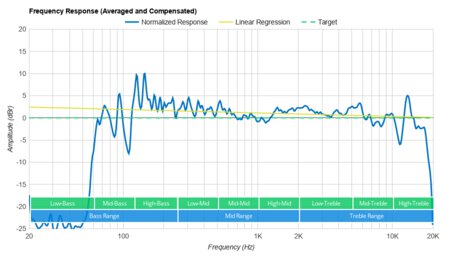
The Bose Revolve speaker has fair frequency response accuracy. Overall, its sound profile is very neutral and well-balanced, which suits many different types of music genres. However, the speaker is lacking low-bass, which can be disappointing for fans of bass-heavy genres like hip-hop and EDM. However, it's very well-balanced in the mid and treble ranges, which is ideal for reproducing vocals and lead instruments. Unfortunately, unlike the Ultimate Ears MEGABLAST, it doesn't come with any sound customization options.

This speaker has a decent stereo soundstage. It's a 360-degree speaker system, so its directivity is large and wide. Unfortunately, it doesn't have separate speakers for the left and right channels, so it downmixes stereo content to mono, which won't provide as immersive a listening experience. For a speaker that supports stereo content, check out the Marshall Emberton.
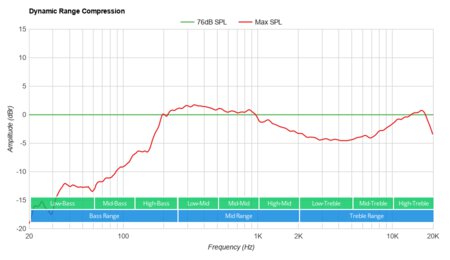
The Bose SoundLink Revolve has a sub-par dynamics performance. This speaker doesn't get very loud, and unlike the OontZ Angle 3, there's a lot of compression when you play the speaker at max volume. It may not be ideal to use in crowded settings like parties.
The Bose SoundLink Revolve has an excellent battery performance. In our test, we measured battery life of over 12 hours off of a single charge, which is great if you want to use the speaker while it isn't connected to a power source. It also has a power-saving feature that automatically turns the speaker off after a certain period of inactivity, which you can adjust in the app. You can even disable this feature by pressing the + button and the Input mode button simultaneously. However, it does take almost four hours to charge.
The Bose SoundLink Revolve has a disappointing voice assistant integration performance. It doesn't have built-in voice assistant capabilities, so it just uses the voice assistant of whatever phone it's connected with. The microphone in the speaker acts as an extension of the phone it's connected to, so the speaker isn't always listening for voice commands. On the upside, it does a great job of understanding speech from a distance, even in noisy environments.
The Bose Revolve has an adequate app. Using the Bose Connect app, you can pair two SoundLink Revolve speakers to create a stereo pair, which can give you a wider-sounding surround soundstage for a more immersive music or movie-watching experience. There's also a Party Mode feature that lets you pair two speakers to play your audio in large, crowded settings, like parties. Unfortunately, there isn't an EQ, so you can't customize the speaker's sound profile. If you're looking for a speaker that has a graphic EQ in its app, try the Sony SRS-XB23. If you prefer to use bass and treble sliders, consider the Sonos One Gen 2/One SL instead.
If you want to connect your devices to the speaker using a cable, there's an AUX input and a USB port available.
The Bose SoundLink Revolve has decent Bluetooth connectivity. It can be paired with up to two devices at a time, which is convenient for listeners who want to be able to switch between their audio sources quickly. It also has an excellent Bluetooth range of 50m, which is longer than the advertised range of 10m. We obtained this measurement in a direct line of sight, and walls or other obstacles will reduce the range. However, this speaker's Bluetooth latency may not be suitable for watching video content, but some apps compensate for this, so your experience may vary. You can also check out the JBL Go 3 or the Bose SoundLink Revolve+ II if you want a speaker with lower iOS and Android latency.
This speaker isn't Wi-Fi compatible. If you're looking for a Bose speaker that supports Wi-Fi, try the Bose Home Speaker 300.


